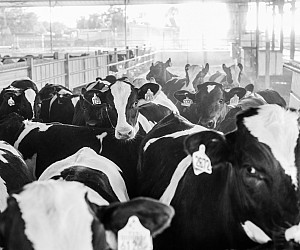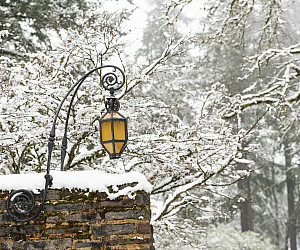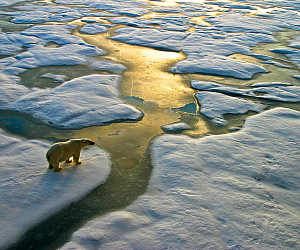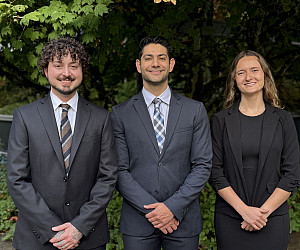Environmental Moot Court Team Triumphant with National Title
Three law students ace the challenging inter-school advocacy competition this year. The environmental law moot court team of 3L students Haley Nicholson, Kassie Kometani and Matt Campa, coached by Professor Craig Johnston, were named national champions of the 2022 Jeffrey G. Miller National Environmental Law Moot Court Competition (NELMCC). Haley Nicholson was honored as the best oralist at the entire competition.

The environmental law moot court team of 3L students Haley Nicholson, Kassie Kometani and Matt Campa, coached by Professor Craig Johnston, emerged as the victorious winners of the 2022 Jeffrey G. Miller National Environmental Law Moot Court Competition (NELMCC). Haley Nicholson was honored as the best oralist at the entire competition. Video of the final arguments are posted on YouTube.
Professor Johnston remarked, “All three of our advocates were awesome at every step of the way. Each of them wound up arguing twice in the advanced rounds: Matt and Kassie in the quarterfinals, where we defeated the Univ. of Washington and Loyola; Matt and Haley in the semifinals, where we triumphed over the Univ. of Pennsylvania and Baylor; and Haley and Kassie in the finals, where we emerged victorious over Duke and Stetson. ”
“This was our eighth national championship in my 31 years, in a competition that has teams from between 50-75 law schools every year,” continued Johnston. “Next year, we’ll be going for number 9!” In addition to the national titles, Lewis & Clark Law students have placed 16 times in the finals, 24 times in the semi-finals, and 29 times in the quarterfinals.
Speaking about the experience, Haley Nicholson noted, “the national competition was a culmination of everything the team had worked for. It was so amazing to see how well the team members were able to show off their preparation and how it shined above the other competitors. Our team even provided new material to the issues that the writer of the national problem (one of the judges) wasn’t aware of.”
Kassie Kometani echoed Nicholson’s comments about the experience, adding its value in improving legal writing and oral argument skills. “I took the Environmental Advocacy class without any expectation of making the team. That being said, I would highly encourage other students who may not feel entirely confident in their advocacy skills to participate in Moot Court since it provides the absolute best learning opportunity. The amount of growth I witnessed not only in myself and our team but also every participant in our fall class competition was truly incredible.”
Matt Campa also remarked that, “bar none, moot court was the most influential experience during law school in terms of developing the skills and legal acumen needed to be successful in practice. All fears and inhibitions melt away once oral argument begins. You revert to your training and practice and surprise yourself with just how good you’ve become.”
Fellow professors praised the students and coach Johnston. Professor Susan Mandiberg said of the students, “their argument in the final round was orders of magnitude better than many I’ve seen at the 9th Circuit.”
Professor Thomas Buchele acknowledged Johnston for his dedication to all students, even those who don’t make the team. “Craig spends at least equal time with each student, indeed maybe more time with those who struggle with the material or the public advocacy. He is clearly dedicated to helping each student learn and improve. Our moot court teams’ successes over the years are remarkable and are a testament to Craig’s talents as a moot court coach and the amazing, talented students we have at L&C.”
The moot court process starts each fall when Prof. Johnston teaches an Environmental Advocacy course to second and third-year law students. The class centers on a moot court experience, but includes much more than that. During the first four or five weeks, each student prepares a brief on a particularly thorny environmental problem laid out by Johnston. Over a three-week period, students engage in six rounds of oral argument regarding the problem. The last three of these are competition rounds, which take place in front of a panel of faculty, alums, and practitioners from the community, giving the students the opportunity to practice thinking on their feet and responding to difficult questions and comments.
The top three advocates to emerge from these rounds are offered the chance to participate as part of the Lewis & Clark team for the national environmental law competition. The national team then writes a brief (due around Thanksgiving) for the competition and begins a series of intense practice rounds – again in front of lawyers from throughout the faculty and community - in preparation for the competition.
Each year the team puts in extraordinary hours to achieve mastery of the subject and law with up to 30 or more practice rounds.
The national competition, held annually, is the largest inter-school moot court competition with over 200 competitors and 150 attorneys participating in grading briefs and serving as judges for the three day competition. The Competition is distinctive in that three adverse teams argue the issues, reflecting the fact that environmental litigation frequently involves multiple parties — the government, a public interest group, and a member of the regulated industry.
Below is an historic listing of Lewis & Clark Law School teams’ success at the national competition:
Champions:
1994 - Jenifer Johnston, Nancy Perry and Scott Shapiro
1995 - Leah Christensen, Jenifer Johnston and Nancy Perry
2002 - Allison LaPlante, Tanya Sanerib and Tyson Smith
2004 - Dave Jones-Landry, Isa Lester and Kristin Ruether
2008 - Bethany Cotton, Liz Crosson and Diana Federoff
2009 - Tarah Heinzen, Erica Maharg and Lizzy Zultoski
2010 - John Krallman, Ben Luckett and Lizzy Zultoski
2022 - Matt Campa, Kassie Kometani, Haley Nicholson
Finalists (top 3):
1992 - Mike Halloran, Stephanie Parent and Vickie Thimmesch
1997 - Paul Conable, Ken Larish and Julie Weis
1998 - Chris Panoff, K.C. Schefski and Peter Scott
2001 - Melissa Powers, Allison LaPlante and Tanya Sanerib
2007 - Dan Mensher, Jamie Saul and Ellen Trescott
2011 – Ellie Dawson, John Krallman, and Marla Nelson
2012 – Marla Nelson, Meredith Price, and Daniel Timmons
2013 - Andy Erickson, Maggie Hall, and Meredith Price
Semifinalists (top 9):
1993 - Scott Ames, Edie Matulka and Sam Rauch
1996 - Ken Larish, Dana Messenger and Julie Weis
2006 - Dawn Dickman, Dan Mensher and Tami Santelli
2014 – Laura Kerr, Daniel Rottenberg, and Ben Saver
2015 – Daniel Rottenberg, Jake Duginski, and Stephanie Grant
2016 – Josh Fortenbery, Cameron Jimmo, and Kathryn Roberts
2017 – Kathryn Roberts, Amy Saack, and Rachel Briggs
2021 – Michael Benjamin Smith, Alex Houston, and Haley Nicholson
Quarterfinalists at Pace (top 27):
1999 - Wendi Hammond, Mike Newhouse and K.C. Schefski
2000 - Wendi Hammond, Mike Newhouse and Melissa Powers
2003 - Lance Clark, Chris Len and Tyson Smith
2018 – Rachel Briggs, Andrew Futerman, and Kacy Manahan
2019 – Rachel Blackburn, Sangye Ince-Johannsen, and Ben Scissors
Law Communications is located in room 304 of Legal Research Center (LRC) on the law Campus.
MSC: 51
email jasbury@lclark.edu
voice 503-768-6605
Cell: 626-676-7923
Assistant Dean,
Communications and External Relations, Law School
Judy Asbury
Law Communications
Lewis & Clark Law School
10101 S. Terwilliger Boulevard MSC 51
Portland OR 97219
More Stories

Comparative Report to Curb the Expansion of Industrial Animal Agriculture
The analysis of how courts are addressing industrial animal agriculture in four countries is the first of its kind from the Farmed Animal Protection Project of the Center of Animal Law Studies (CALS).

Year in Review
Top Stories of 2025
As the calendar year draws to a close, we’ve compiled a sampling of top stories from the undergraduate college, the graduate school, and the law school.

Justice for Animals and the Environment on a Global Scale
The law school’s Global Law Alliance is helping to advance environmental and wildlife protections across the globe while giving students hands-on experience in international law.

2025-2026 Multnomah Bar Association Fellows Announced
Three 1ls were named as Multnomah Bar Association Fellows: Finn Johnson, Hooman Dadkho, and Christina Smith
